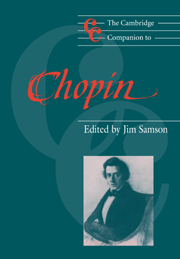Book contents
- Frontmatter
- Myth and reality: a biographical introduction
- PART 1 The growth of a style
- PART 2 Profiles of the music
- PART 3 Reception
- 9 Chopin in performance
- 10 Chopin reception in nineteenth-century Poland
- 11 Victorian attitudes to Chopin
- 12 Chopin's influence on the fin de siècle and beyond
- Appendix A historical survey of Chopin on disc
- Notes
- List of Chopin's work
- Bibliographical note
- Index
10 - Chopin reception in nineteenth-century Poland
from PART 3 - Reception
Published online by Cambridge University Press: 28 September 2011
- Frontmatter
- Myth and reality: a biographical introduction
- PART 1 The growth of a style
- PART 2 Profiles of the music
- PART 3 Reception
- 9 Chopin in performance
- 10 Chopin reception in nineteenth-century Poland
- 11 Victorian attitudes to Chopin
- 12 Chopin's influence on the fin de siècle and beyond
- Appendix A historical survey of Chopin on disc
- Notes
- List of Chopin's work
- Bibliographical note
- Index
Summary
Every age views musical works in its own way. The study of reception documents the changing functions and meanings attributed to a given corpus of music in particular milieus and at particular times, and in doing so it can enable generalisations about the role that music plays within society. This chapter assesses the part played by Chopin's music in nineteenth-century Polish culture, describing prevailing attitudes to his works and identifying the specific distinguishing features of Polish reception.
Literature on Chopin reception in Poland is exiguous, addressing only small corners of the field and concentrating for the most part on the views of composers and critics. The present study broadens this to consider ‘social’ reception (a historical-aesthetic interpretation of the ways in which the music was received by listeners) as well as ‘artistic’ reception (the influence of the music on the artistic world). Even so the study has certain constraints. From the artistic viewpoint, it will consider only Chopin's influence on other music. And from the social viewpoint, it is hampered by the restricted nature of source materials and by limited opportunities for research.
A study of present-day reception is of course facilitated by modern sociological methods such as questionnaires. These enable us to establish differences among various social circles and to determine the extent to which the reception of a composer's work is uniform at a given time and in a given milieu. Thus one can study fairly systematically the socio-functional aspect of reception in today's world. For earlier periods, however, the possibility of such study is very limited. In this case social reception must rely upon indirect sources such as critical literature and the repertoire performed.
- Type
- Chapter
- Information
- The Cambridge Companion to Chopin , pp. 206 - 221Publisher: Cambridge University PressPrint publication year: 1992

